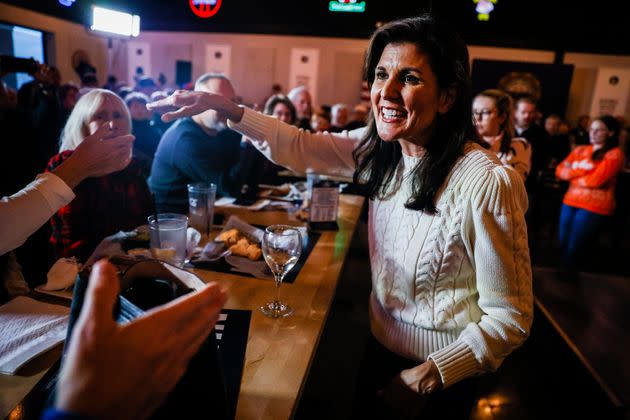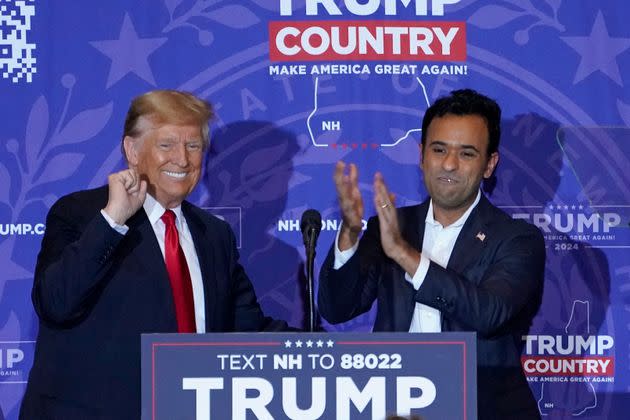Haley’s High Point Is Likely To Be In New Hampshire’s Mountains

Former South Carolina Gov. Nikki Haley greets supporters at a sports bar in Londonderry, New Hampshire.
Former South Carolina Gov. Nikki Haley’s rise in New Hampshire has been nothing short of remarkable. In late August, an average of polls had her getting about 4% of the vote. Those same polls now show her with nearly 31% support.
Her rapid rise, however, has still left her some 13 percentage points shy of former President Donald Trump, who romped with 51% of the vote in the Iowa caucuses earlier this week. The gap between her and the GOP front-runner raises questions about her ability to turn a coronation ceremony for Trump into a truly contested primary for the GOP nomination.
It’s not hard to see why the Granite State is ripe terrain for Haley, who served as Trump’s ambassador to the United Nations. A purple battleground state, New Hampshire is among the least religious states in the country and the most highly educated, making it a hub for exactly the kind of affluent Republican, libertarian and independent voters most likely to find Haley’s establishment bearing, calm demeanor, and comparative moderation on social and cultural views appealing. Its open primary system leads to higher turnout, and welcomes independents and even crossover Democrats to cast ballots.
“You’re not just getting ideological voters,” said Andrew Smith, a professor of political science at the University of New Hampshire. “You’re getting regular folks who come out to vote.”
The problem for Haley is that very few other states are like New Hampshire: Most are either demographically distinct or operate with closed primaries, denying her the support of independent voters. Florida Gov. Ron DeSantis is making a last-ditch argument to voters that disqualifies her as a viable alternative to Trump.
“She was really relying on non-Republicans, for her vote support. You can’t rely on non-Republicans to win a Republican nomination, but especially against Donald Trump,” DeSantis said in a Tuesday interview with Dasha Burns on NBC News. “How are you going to be able to compete in that situation?”
Electability ― first against Trump and then against Biden ― is a key reason why Jason Osborne, the Republican majority leader of New Hampshire’s House of Representatives, is backing DeSantis.
“Her slice of the Republican electorate can’t grow,” he said of Haley.
The stakes for Osborne are personal: He anticipates that if Trump is the GOP nominee, New Hampshire Republicans will lose control of the state legislature and governorship.
But fellow state Rep. Mike Moffett insists that New Hampshire is poised to give Haley the boost that the state gave to former Presidents Ronald Reagan, George H.W. Bush and Bill Clinton who all performed well there after poor showings in Iowa.
“The trajectory a candidate takes out of New Hampshire especially matters ― even more so than Iowa,” said Moffett, a retired college professor and former Marine Corps officer.
What Haley’s boosters and detractors seem to agree on, though, is that she has little room for error going forward. In all likelihood, she must win in New Hampshire to even have a shot of prevailing in her home state of South Carolina on Feb. 24.
“If she’s going to get a win, this is the place it’s going to happen,” Moffett said.
It is easier for Trump to capitalize on losing here, than it is for Haley to capitalize on winning here.Christopher Galdieri, St. Anselm College
The state has, after all, elected Republicans to control the state legislature, even as every one of its representatives in Congress is a Democrat. The state’s fiscally conservative Republican Gov. Chris Sununu ― the living embodiment of an old-school “Rockefeller Republican” ― has endorsed Haley. And Haley’s disappointing, third-place finish in Iowa is unlikely to move those northern New England voters who pride themselves on zagging where Iowans zig.
“The issues that resonate with voters in Iowa just don’t really resonate with Republican voters in New Hampshire,” Smith said.
By the same token though, the very qualities that make New Hampshire uniquely receptive to Haley’s even-keeled charisma and business-friendly views could also undermine the state’s relevance to the larger Republican primary contest.
The 2000 contest between then-Texas Gov. George W. Bush and then-Arizona Sen. John McCain is the most famous precedent for New Hampshire Republicans’ independent streak having limited implications for more traditional Republican primary voters. That year, McCain ― a self-described “maverick” who relished bucking his party on a handful of issues ― scored an upset win over Bush in New Hampshire.
But Bush rebounded in South Carolina, where socially conservative voters who prioritized “moral values” gave him the edge. He ran up the score a month later on Super Tuesday, prompting McCain to drop out a few days later ― nearly three months before the party’s final nominating contests.
To win in South Carolina, Bush’s allies infamously engaged in a racist whisper campaign about McCain’s adopted South Asian daughter.

Biotech entrepreneur Vivek Ramaswamy endorses former President Donald Trump in Atkinson, New Hampshire, on Tuesday. Ramaswamy's withdrawal could help Trump.
Trump has hinted that he might resort to similar xenophobic dog-whistling against Haley, a daughter of Indian immigrants. In a Jan. 8 post on TruthSocial, Trump shared a fringe website’s false claim that Haley does not meet the constitutional requirements to run for president.
But Trump might not need to dwell on that particular accusation to discredit Haley in the eyes of more right-wing Republican voters. He has already branded her a “globalist,” whose ties to donors from the big business world make her an untrustworthy steward of the MAGA agenda. And following his win in the Iowa caucuses, Trump warned a crowd of New Hampshire Republicans that Haley is “counting on the Democrats and liberals to infiltrate your Republican primary.”
A Haley win in New Hampshire could actually help Trump make that case.
“He can say, ‘It’s a bunch of RINOs [Republicans in name only] in that corrupt state where they stole it from me in 2016,’” predicted Christopher Galdieri, a politics professor at St. Anselm College in Goffstown, New Hampshire.
“He can say, ‘You can avenge my loss in New Hampshire,’” Galdieri added. “It is easier for Trump to capitalize on losing here, than it is for Haley to capitalize on winning here.”
All of that, of course, is contingent on Haley actually pulling off a first-place finish in New Hampshire.
While Christie’s departure ― and potentially, former Arkansas Gov. Asa Hutchinson’s ― might redound to Haley’s advantage, biotech entrepreneur Vivek Ramaswamy’s withdrawal, and subsequent endorsement of Trump, is likely to benefit Trump.
ABC News’ entrance poll in Iowa showed her winning among only two demographic categories: voters with advanced degrees and self-identified moderates. Haley also won only one of Iowa’s 99 counties: Johnson County, which is home to liberal Iowa City and the University of Iowa.

